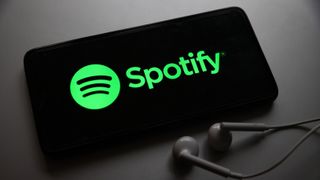Spotify accused of pushing ghost artists into our playlists — here's what's going on
Pushing generic, cheaply made songs

As the year winds down, Spotify, which should be going out on a high, is instead mired in controversy.
After slogging through a controversial Spotify Wrapped season, Spotify is now being accused of filling playlists and recommendations with fake artists and cheap, generic music in a new report from Harper's magazine.
According to the report, a program called Perfect Fit Content (PFC) is loading up some genre playlists with cheaply made songs.
Harper's report is in-depth and a worth a read, but here's the gist of what's happening in Spotify. Simply, Spotify is allegedly purchasing songs from production companies who essentially make copy-cat songs. The music is built to sound like other artists' songs while costing Spotify pennies on the dollar. From there employees at Spotify are reportedly pushing this pablum into playlists at the expense of other, real artists.
For Spotify the company this means that they get music for a cheaper cost as the production companies are only paying a flat fee sans future royalty payments for the musicians. For fans of music it "it raises worrying questions for all of us who listen to music."
Spotify has reportedly denied these claims according to Harper's and Tom's Guide is reaching out for further comment.
What genres are infected with ghost musicians?
For now, the playlists and recommendations being stuffed with muzak and fake artists are those with genres considered "background music." Examples include genres like chill beats or lo-fi house.
Sign up to get the BEST of Tom's Guide direct to your inbox.
Get instant access to breaking news, the hottest reviews, great deals and helpful tips.
Since this music is generally intended to fill a space, the thought is that most people wouldn't really notice who the artist is making those chill beats. Instead, the music pushed there is meant to make the playlist more profitable for Spotify by pushing down real artists so Spotify has to pay less. As Harper's says, why pay royalties for songs that people aren't paying attention to?
There is a wide variety of genres that Spotify is apparently considering this way, from jazz and classical music to ambient and electronica. There are already a ton of artists producing this music on Spotify. If Spotify is actually pushing them down, its going to ruin the careers of people making that music and potentially degrade those genres.
As Liz Pelly writes for Harper's, "Spotify had long marketed itself as the ultimate platform for discovery — and who was going to get excited about 'discovering' a bunch of stock music? Artists had been sold the idea that streaming was the ultimate meritocracy – that the best would rise to the top because users voted by listening. But the PFC program undermined all this."
That said, according to Pelly, a number of Spotify editors were apparently against this process.
But what about AI?
Like nearly tech company this year, Spotify has been leaning into artificial intelligence with an AI DJ, AI built playlists, and in November, Spotify teamed up with Google Gemini to integrate AI into your Spotify algorithms.
As Harper's notes, some of the production companies Spotify is working with are already planning to allow its writers to use AI tools to generate songs.
An editor said, "“I’m sure it’s something that AI could do now, which is kind of scary."
Spotify's CEO Daniel Ek has previously said in 2023 that AI-generated content would be "great culturally" before crowing about increased revenue, the important part of the puzzle.
More from Tom's Guide

Scott Younker is the West Coast Reporter at Tom’s Guide. He covers all the lastest tech news. He’s been involved in tech since 2011 at various outlets and is on an ongoing hunt to build the easiest to use home media system. When not writing about the latest devices, you are more than welcome to discuss board games or disc golf with him.
-
Vlad The Inhaler No mention of the CEO's sudden wealth increase of about $400 Million at the same time that this crap was being introduced.Reply
On February 7, Spotify’s CEO sold 250K shares for $57.5 million.
On April 24, Spotify’s CEO sold 400K shares for $118.8 million.
On November 15, Spotify’s CEO sold 75K shares for $35.8 million.
On November 20, Spotify’s CEO sold 75K shares for $34.8 million.
On November 26, Spotify’s CEO sold 75K shares for $36.1 million.
On December 4, Spotify’s CEO sold 75K shares for $37 million.
On December 11, Spotify’s CEO sold 60K shares for $28.3 million.